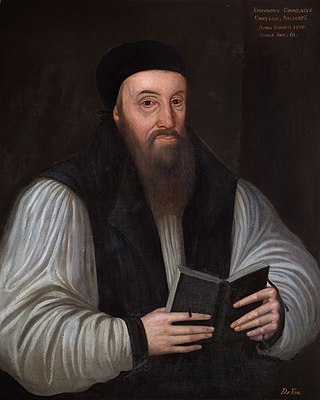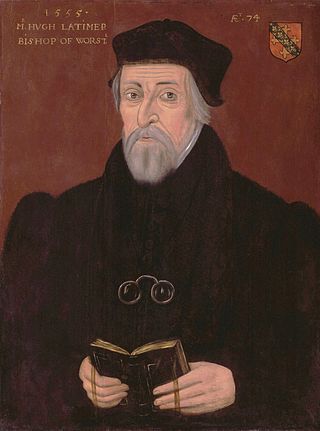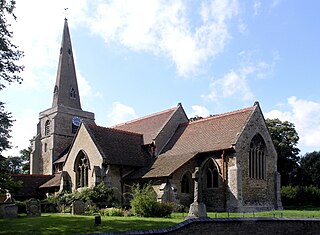Related Research Articles

Thomas Cranmer was a religious figure who was leader of the English Reformation and Archbishop of Canterbury during the reigns of Henry VIII, Edward VI and, for a short time, Mary I. He helped build the case for the annulment of Henry's marriage to Catherine of Aragon, which was one of the causes of the separation of the English Church from union with the Holy See. Along with Thomas Cromwell, he supported the principle of royal supremacy, in which the king was considered sovereign over the Church within his realm.

Edmund Grindal was Bishop of London, Archbishop of York, and Archbishop of Canterbury during the reign of Elizabeth I. Though born far from the centres of political and religious power, he had risen rapidly in the church during the reign of Edward VI, culminating in his nomination as Bishop of London. However, the death of the King prevented his taking up the post, and along with other Marian exiles, he was a supporter of Calvinist Puritanism. Grindal sought refuge in continental Europe during the reign of Mary I. Upon Elizabeth's accession, Grindal returned and resumed his rise in the church, culminating in his appointment to the highest office.

Hugh Latimer was a Fellow of Clare College, Cambridge, and Bishop of Worcester during the Reformation, and later Church of England chaplain to King Edward VI. In 1555 under the Catholic Queen Mary I he was burned at the stake, becoming one of the three Oxford Martyrs of Anglicanism.

Nicholas Ridley was an English Bishop of London. Ridley was one of the Oxford Martyrs burned at the stake during the Marian Persecutions, for his teachings and his support of Lady Jane Grey. He is remembered with a commemoration in the calendar of saints in some parts of the Anglican Communion on 16 October.

Rowland Taylor was an English Protestant martyr during the Marian Persecutions.
John Scory was an English Dominican friar who later became a bishop in the Church of England.

Stretham is a village and civil parish 4 miles (6 km) south-south-west of Ely in Cambridgeshire, England, about 74 miles (119 km) by road from London. Its main attraction is Stretham Old Engine, a steam-powered pump used to drain the fens. The pump is still in use today although converted to electric power. It has open days throughout the year.
James Brooks was an English Catholic clergyman and Bishop of Gloucester.

John Boys (1571–1625) was Dean of Canterbury from 1619 to 1625.
Thomas Sedgwick (Segiswycke) was an English Roman Catholic theologian. An unfriendly hand in 1562 describes him as "learned but not very wise".
Henry Cole was a senior English Roman Catholic churchman and academic.
John White was a Headmaster and Warden of Winchester College during the English Reformation who, remaining staunchly Roman Catholic in duty to his mentor Stephen Gardiner, became Bishop of Lincoln and finally Bishop of Winchester during the reign of Queen Mary. For several years he led the college successfully through very difficult circumstances. A capable if somewhat scholastic composer of Latin verse, he embraced the rule of Philip and Mary enthusiastically and vigorously opposed the Reformation theology.
Samuel Collins (1576–1651) was an English clergyman and academic, Regius Professor of Divinity at Cambridge and Provost of King's College, Cambridge.
Thomas Drant (c.1540–1578) was an English clergyman and poet. Work of his on prosody was known to Sir Philip Sidney and Edmund Spenser. He was in the intellectual court circle known as the 'Areopagus', and including, as well as Sidney, Edward Dyer, Gabriel Harvey, and Daniel Rogers. He translated Horace into English, taking a free line in consideration of the Roman poet's secular status; but he mentioned he found Horace harder than Homer. Drant's translation was the first complete one of the Satires in English, in fourteeners, but makes some radical changes of content.

John Young (1514–1580) was an English Catholic clergyman and academic. He was Master of Pembroke Hall, Cambridge, and was later imprisoned by Elizabeth I. He is not John Young (1534?–1605), Master of Pembroke Hall later in the century, and afterwards Bishop of Rochester.
John Bullingham was the Bishop of Gloucester in the Church of England from 1581.
The college of Six Preachers of Canterbury Cathedral was created by Archbishop Thomas Cranmer as part of the reorganisation of the monastic Christ Church Priory into the new secular Cathedral. First mentioned in a letter of Cranmer to Thomas Cromwell in 1540, the Six Preachers were established by the Statutes of 1541. They were provided with houses in the Precincts but quickly became non-resident and rented out their properties. They had the right to dine with the Dean and Canons and to sit in the stalls in the quire with the canons during services. They were required to preach 20 sermons a year in their own parishes or in a church dependent on the Cathedral, as well as preaching in the Cathedral.

St James' Church, Stretham, is an active Anglican church in the village of Stretham, Cambridgeshire, England. Founded in the 12th century, it was heavily restored by the architect J. P. St Aubyn in 1876. English Heritage, a body responsible for preserving historical sites in the United Kingdom, assessed the church a Grade II* listed building. The turret clock on the east face of the tower was also made in 1876, by JB Joyce & Co of Whitchurch, Shropshire, and still keeps good time. The church has a ring of six bells hung for change ringing. Regular ringing resumed at the church in June 2011 after several years' silence. St James' is one of eight churches in the Ely Team Ministry.
Edward Crome was an English reformer and courtier.
Alban Langdale or Langdaile was an English Roman Catholic churchman and author.
References
- ↑ "Ridley, Lancelot (RDLY521L)". A Cambridge Alumni Database. University of Cambridge.
- ↑ Diarmaid McCulloch (1996), Thomas Cranmer, pp. 284-286.
- ↑ John Foxe, s:The Book of Martyrs (Foxe)/Chapter XVI#Archbishop Cranmer
- ↑ "Preface | British History Online".
- ↑ George Steinman, A History of Croydon (1834), p. 21, https://archive.org/stream/ahistorycroydon00steigoog#page/n55/mode/1up
- ↑ "Willingham: Church | British History Online".
- ↑ "History of the Parish Church of WIllingham". www.oldwillingham.com. Archived from the original on 15 July 2011.
- 1 2 3 4 5 . Dictionary of National Biography . London: Smith, Elder & Co. 1885–1900.
- Attribution
![]() This article incorporates text from a publication now in the public domain : "Ridley, Lancelot". Dictionary of National Biography . London: Smith, Elder & Co. 1885–1900.
This article incorporates text from a publication now in the public domain : "Ridley, Lancelot". Dictionary of National Biography . London: Smith, Elder & Co. 1885–1900.